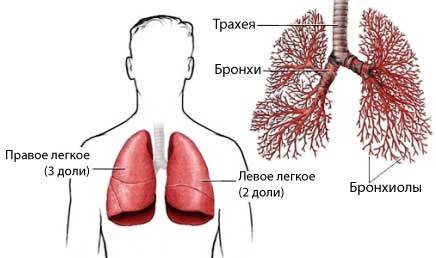Acute Bronchitis – Lower respiratory tract infections
Description of acute bronchitis
Air passes into the lungs through the respiratory tract, called bronchi. Bronchitis – This swelling of the bronchial tubes. It can obstruct breathing.
There are different types of bronchitis:
- Sharp bronchitis – the sudden appearance of symptoms of bronchitis. It lasts for a short time, with full recovery of lung function;
- Chronic bronchitis – a serious, long-term illness, which leads to blockage and damage to the lungs. Chronic bronchitis is often the result of years of smoking.
This article describes the acute bronchitis.

Causes of Acute Bronchitis
Swelling in the bronchi can cause:
- Viral and bacterial infections;
- Smoking (cigarettes or marijuana);
- Inhalation of certain stimuli (usually, at work):
- Ammonia;
- Chlorine;
- Dust minerals;
- Plant pollen.
Risk factors for bronchitis
Risk factors include bronchitis:
- Availability colds or Flu;
- Contact with a person with a respiratory viral or bacterial infection;
- Smoking;
- Exposure to tobacco smoke;
- Asthma;
- Inhalation of volatile substances at work;
- Poor functioning of the immune system.
Symptoms of Acute Bronchitis
Symptoms of acute bronchitis may include:
- Cough;
- Increased sputum;
- Labored breathing;
- Hoarse voice.
You may also have other symptoms of a cold or flu, such as mild fever, sore throat and nasal congestion.
Diagnosis of acute bronchitis
The doctor will ask about your symptoms and medical history, a physical exam.
Additional tests are rarely appointed. If bronchitis is severe and the diagnosis is not clear, The following may be recommended:
- Blood test;
- Chest X-ray, to look for other disorders, such as pneumonia;
- Sputum culture, to check for the presence of pathogenic bacteria.
Treatment of acute bronchitis
Treatment is focused on relief of symptoms. Your doctor may recommend:
- Ibuprofen or acetaminophen to treat pain and fever;
- Attention: Children and teens with a current or recent viral infection should not take aspirin, because of the risk of Reye's syndrome. Ask your doctor, What other medicines are safe for your child;
- Expectorants and medication for cough relief;
- There are some concerns about the safety of medicines for coughs and colds for children. These drugs should not be prescribed to children younger than 2 years, and to refrain from using children under the age of 4 years;
- Albuterol, to open the airway, if there are signs of difficulty breathing;
- Herbs and Supplements – a plant extract of Pelargonium (Pelargonium sidoides) may reduce symptoms in patients with acute bronchitis;
- Increased fluid intake;
- Humidifier facilitate breathing.
If the infection is caused by a virus, antibiotic treatment is ineffective. The cause of most respiratory infections are viruses.
If you are diagnosed with bronchitis, you need to follow your doctor's instructions.
Preventing acute bronchitis
To reduce the likelihood of ill with bronchitis, need:
- Avoid contact with people, who are sick with respiratory viral or bacterial infections;
- Stop smoking or never start;
- Avoid passive smoking;
- Avoid inhalation of airway irritants, which are in the air.
